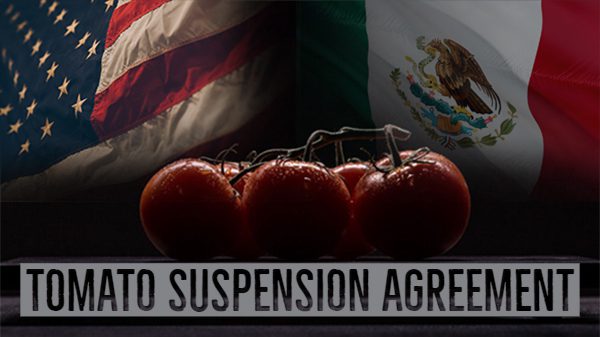
The tomato suspension agreement and general subject of the dumping of Mexican tomatoes on the U.S. market gets people worked up.
It’s hot this year because the 2013 agreement was terminated in May, but it’s been a sore subject for more than 20 years between Florida tomato growers and Mexican growers and their U.S.-based importers.
Consumers enjoy tomatoes, whether grown in Mexico, Florida, greenhouse, shade house or field or grown in their own backyard.
Buyers are caught between importers and domestic producers just trying to fill consumer demand.
Likewise, we at Blue Book Services’ Media Division are caught in between, so we want to explain our process as the issue comes to a deadline in a few months. The Department of Commerce is expected to complete its investigation by mid-September, but it needs a 30-day notification period, so an agreement would need to be reached by mid-August to hit that deadline.
Blue Book Services has members on all sides of this issue. Editorially, we do not have a position on who is right or which side should get provisions.
We have decided to run anyone’s point of view or press release, as long as it’s relevant and professional. Sometimes we know the language can be charged, but we want our readers and the industry to know where each side is coming from in their words, as much as we can.
We want ProduceBlueBook.com and our related social media to be a forum for the industry to see what points are being made.
A good way to get all the coverage is to click on the “tomato suspension agreement” tag at the bottom of each of these stories. https://www.producebluebook.com/tag/tomato-suspension-agreement/
The tomato suspension agreement and general subject of the dumping of Mexican tomatoes on the U.S. market gets people worked up.
It’s hot this year because the 2013 agreement was terminated in May, but it’s been a sore subject for more than 20 years between Florida tomato growers and Mexican growers and their U.S.-based importers.
Consumers enjoy tomatoes, whether grown in Mexico, Florida, greenhouse, shade house or field or grown in their own backyard.
Buyers are caught between importers and domestic producers just trying to fill consumer demand.
Likewise, we at Blue Book Services’ Media Division are caught in between, so we want to explain our process as the issue comes to a deadline in a few months. The Department of Commerce is expected to complete its investigation by mid-September, but it needs a 30-day notification period, so an agreement would need to be reached by mid-August to hit that deadline.
Blue Book Services has members on all sides of this issue. Editorially, we do not have a position on who is right or which side should get provisions.
We have decided to run anyone’s point of view or press release, as long as it’s relevant and professional. Sometimes we know the language can be charged, but we want our readers and the industry to know where each side is coming from in their words, as much as we can.
We want ProduceBlueBook.com and our related social media to be a forum for the industry to see what points are being made.
A good way to get all the coverage is to click on the “tomato suspension agreement” tag at the bottom of each of these stories. https://www.producebluebook.com/tag/tomato-suspension-agreement/
Greg Johnson is Director of Media Development for Blue Book Services.



